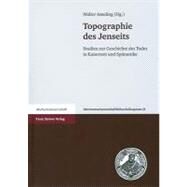Topographie Des Jenseits: Studien Zur Geschichte Des Todes in Kaiserzeit Und Spatantike
, by Ameling, Walter- ISBN: 9783515098823 | 3515098828
- Cover: Paperback
- Copyright: 6/13/2011
English summary: A preoccupation with death is the part of the histories of the humanities, religion, and thought that has become increasingly important in recent decades. It becomes ever clearer that the perception people have of death is not uniform, but is subject to continuous change. Not only human thought, but also action is dependent on these ideas. In the development of the idea of the afterlife, the so-called second saddle period plays a particularly important role: the transition from antiquity to the Middle Ages, from pagan to Christian societies. During the times of these transitions, very different conceptions of the afterlife can be found. The ideas of the pagan philosophers are seen by Christian writers, the pagan literature with its variations still being present, and then transformed into Christian literature. Exactly in these fields of transition the authors of this volume characterize man's concrete perception of death: the afterlife has always been a place that was thought to be either hell or a palace, a Garden of Eden or an open countryside - a describable topos that changes with time. German text. German description: Die Beschaftigung mit dem Tod ist ein Teil der Geistes-, Religions- und Mentalitatsgeschichte, der in den letzten Jahrzehnten zunehmend wichtiger geworden ist. Es wird dabei immer deutlicher, dass die Vorstellungen, die sich die Menschen vom Tod machen, nicht einheitlich, sondern einem dauernden Wandel unterzogen sind. Nicht nur menschliches Denken, sondern auch das Handeln ist von diesen Vorstellungen abhangig.In der Entwicklung der Ideen vom Jenseits spielt die sog. azweite Sattelzeit eine besonders wichtige Rolle: der Ubergang von der Antike zum Mittelalter, von paganen zu christlichen Gesellschaften. In den Zeiten dieses Uberganges stehen ganz unterschiedliche Vorstellungen vom Jenseits nebeneinander. So wirkten die Ideen der paganen Philosophen bei christlichen Autoren nach, ist die pagane Literatur mit ihren Auspragungen noch prasent und wird in christliche Literatur verwandelt. Genau in diesem Feld des Ubergangs charakterisieren die Autoren des Bandes die konkreten Vorstellungen des Menschen vom Tod: das Jenseits war immer auch ein Ort, den man sich als Holle oder Palast, als Garten Eden oder als weite Landschaft dachte - eben ein beschreibbarer Topos, der sich mit der Zeit wandelte.






